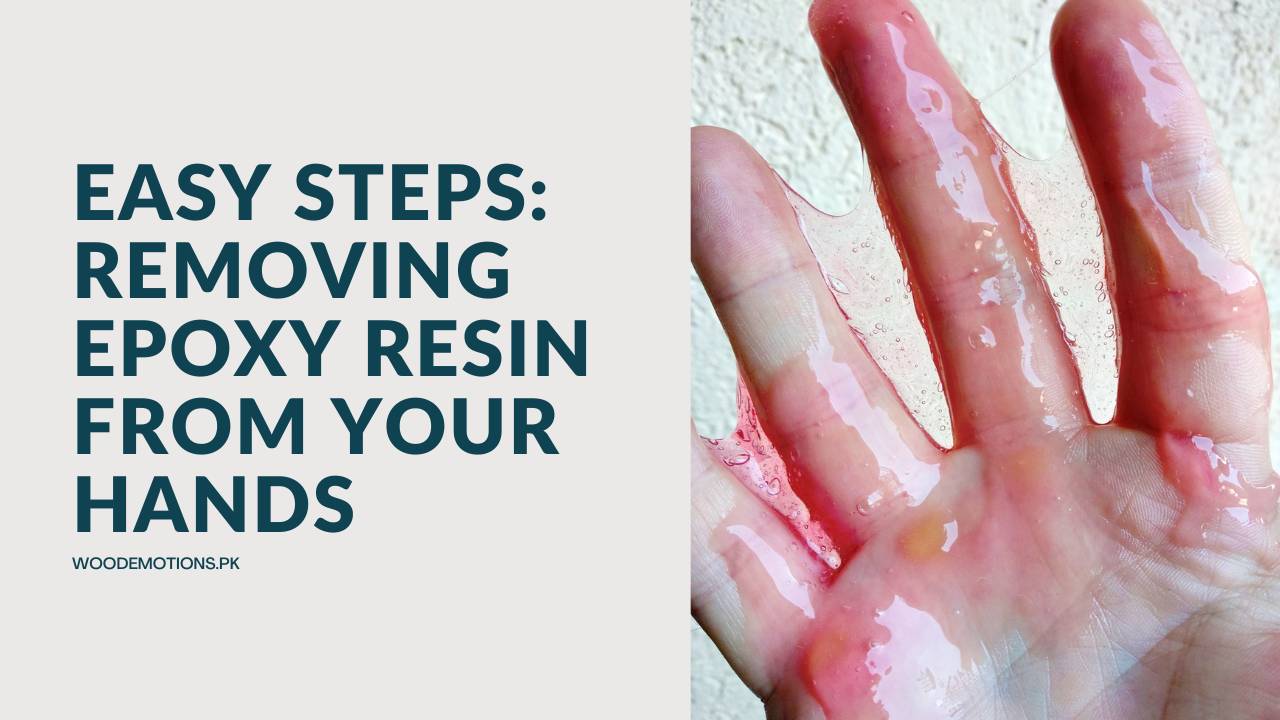Epoxy resin is a fantastic material for crafting, repairing, and sealing various objects. However, it has one pesky downside: it's incredibly sticky and challenging to remove from your hands once it gets on them. If you've found yourself in this sticky situation, fear not!
You can remove epoxy resin from your hands using the following methods: Washing with Soap and Water, Using Vinegar or Acetone, Using Commercial Hand Cleaners, and using Natural Remedies.
In this article, we'll explore several effective methods for removing epoxy resin from your hands without too much hassle.
You might wanna know: How Long Does Epoxy Resin Take To Dry
Why It's Important to Remove Epoxy Resin From Hands
Epoxy resin, while an excellent adhesive and sealant, can be unforgiving when it comes into contact with your skin. Before we dive into the nitty-gritty, let me point you in the right direction: our epoxy collection page is your one-stop shop for all your epoxy needs.
Whether for crafting, repairing, or sealing, we've got you covered with top-quality epoxy products to tackle any project confidently. Here are several reasons why removing epoxy resin from your hands promptly is essential:
1. Skin Irritation and Allergic Reactions
Uncured epoxy resin contains chemicals that can irritate the skin, leading to discomfort, redness, and even allergic reactions. Leaving resin on your hands increases the likelihood of experiencing these adverse effects.
2. Chemical Burns
Prolonged exposure to uncured epoxy resin can result in chemical burns on the skin. The chemicals in epoxy resin can be harsh, especially when they come into contact with sensitive areas of the skin or open wounds.
3. Contamination of Other Surfaces
Continuing to work with epoxy resin on your hands risks transferring the resin to other surfaces, tools, or materials. This can lead to unwanted adhesion or contamination, affecting the quality and appearance of your projects.
4. Difficulty in Handling Objects
Sticky or tacky resin on your hands can make it challenging to handle objects effectively. This can compromise your ability to work accurately and efficiently, potentially leading to mistakes or accidents.

Visit the Rocketry Forum for detailed insights into cleaning epoxy off your hands.
Methods to Remove Epoxy Resin From Hands
When it comes to removing epoxy resin from your hands, there are several effective methods you can try. Each method varies in its approach and effectiveness, so feel free to experiment to find the one that works best for you.
1. Washing with Soap and Water
This is the most straightforward and readily available method for removing epoxy resin from your hands. Here's how to do it:
- To effectively remove epoxy resin from hands, wet them with warm water to soften the resin.
- Apply a generous amount of degreasing soap, ensuring it covers all areas.
- Scrub vigorously, concentrating on resin-heavy spots, to lift the resin from the skin.
- Rinse hands thoroughly with warm water to remove all traces of soap and resin.
2. Using Vinegar or Acetone
If soap and water aren't enough, you can turn to household items like vinegar or acetone for more potent resin removal. Here's how to use them safely:
- Preparation: Ventilate the area well if using acetone, as it can be strong-smelling and irritating to the eyes and respiratory system.
- Apply the Solution: Soak a clean cloth or cotton ball with vinegar or acetone. Gently wipe the affected areas of your hands, ensuring the resin is saturated thoroughly.
- Let It Sit: Allow the vinegar or acetone to sit on your skin for a few minutes. This gives it time to penetrate and break down the resin.
- Scrub and Rinse: Use a clean cloth or brush to scrub the resin away after letting it sit. Rinse your hands thoroughly with warm water to remove any residue.
3. Using Commercial Hand Cleaners
Numerous commercial hand cleaners are specifically designed to remove harsh substances like epoxy resin. Here's how to use them effectively:
- Choose the Right Product: Look for a hand cleaner labeled as "epoxy resin remover" or "industrial hand cleaner." These products are formulated to dissolve or scrub away resin effectively.
- Follow Instructions: Read the manufacturer's instructions carefully and follow them precisely. Some cleaners may require you to apply the product and let it sit for a few minutes before rinsing.
- Scrub and Rinse: Use a brush or scrubbing pad to work the cleaner into your hands, focusing on areas with stubborn resin buildup. Rinse your hands thoroughly with warm water afterwards.
4. Natural Remedies
If you prefer natural alternatives, several household items can help remove epoxy resin from your hands. Here are a few options:
- Lemon Juice: The acidic properties of lemon juice can help break down epoxy resin. Rub lemon juice onto your hands and let it sit for a few minutes before rinsing.
- Baking Soda Paste: Mix baking soda with a small amount of water to create a paste. Apply the paste to your hands and gently scrub to remove the resin.
- Olive Oil: Olive oil can help soften and dissolve epoxy resin. Apply a generous amount to your hands and massage them, then rinse with warm water.
5. Using Petroleum Jelly

Petroleum jelly, such as Vaseline, can also effectively remove epoxy resin from hands. Here's how to use it:
- Apply Petroleum Jelly: Rub a generous amount of petroleum jelly onto your hands, focusing on areas with epoxy resin.
- Massage In: Gently massage the petroleum jelly into your skin, paying particular attention to any stubborn resin spots.
- Let It Sit: Allow the petroleum jelly to sit on your hands for a few minutes to soften the resin.
- Wipe Away: Use a clean cloth or paper towel to remove the petroleum jelly and dissolved resin. Repeat as needed until all the resin is removed.
6. Using Hand Scrub
A hand scrub, such as those used for mechanics or industrial workers, can effectively remove epoxy resin from hands. Here's how to use it:
- Apply Hand Scrub: Apply a small amount of hand scrub to your hands, focusing on areas with resin buildup.
- Scrub Thoroughly: Rub the hand scrub into your skin, using circular motions to work it into the resin.
- Let It Sit: Allow the hand scrub to sit on your hands for a few minutes to penetrate the resin.
- Rinse: Rinse your hands thoroughly with warm water, using a brush or scrubbing pad to help remove any remaining residue.
7. Using Nail Polish Remover
Nail polish removers, particularly those containing acetone, can effectively remove epoxy resin from hands. Here's how to use it safely:
- Preparation: Choose a nail polish remover that contains acetone for the best results.
- Apply to Cotton Ball: Pour a small amount of nail polish remover onto a cotton ball or pad.
- Wipe Gently: Wipe the affected areas of your hands with the soaked cotton ball, being careful not to rub too hard.
- Rinse Thoroughly: After removing the resin, rinse your hands thoroughly with warm water to remove any residue from the nail polish remover.
8. Using Sand or Pumice Stone
For stubborn or dried epoxy resin, abrasive materials like sand or a pumice stone can help mechanically remove the residue. Here's how to use them safely:
- Wet Hands: Wet your hands with warm water to soften the resin slightly.
- Apply Sand or Pumice: Sprinkle a small piece of sand or apply the pumice stone to your hands.
- Scrub Gently: Gently scrub the affected areas with the sand or pumice stone, using circular motions.
- Rinse and Moisturize: Rinse your hands thoroughly with warm water and apply a moisturizing lotion to soothe any irritation.
For further information, visit Let's Run Forum to explore additional insights on the topic. Engage with discussions and gather diverse perspectives from the community.
FAQs
Q1: Is epoxy resin safe to use?
Yes, epoxy resin is generally safe to use when handled properly. However, following safety precautions and minimizing direct skin contact is essential to avoid irritation or allergic reactions.
Q2: Can I use rubbing alcohol to remove epoxy resin from my hands?
Rubbing alcohol can effectively remove epoxy resin from your hands but may also cause dryness or irritation. It's best to use it sparingly and moisturize your skin afterwards.
Q3: How long does it take for epoxy resin to cure on the skin?
The curing time for epoxy resin can vary depending on temperature and humidity. Generally, it takes anywhere from a few minutes to several hours for epoxy resin to fully cure on the skin.
Q4: What should I do if I accidentally ingest epoxy resin?
If you accidentally ingest epoxy resin, seek medical attention immediately. Do not induce vomiting unless instructed to do so by a medical professional.
Q5: Can I reuse gloves that have come into contact with epoxy resin?
Reusing gloves that have come into contact with epoxy resin is not recommended, as they may contain residual resin that could transfer to other surfaces or skin. Always use fresh gloves for each handling session.
In conclusion
Whether you opt for washing with soap and water, using vinegar or acetone, relying on commercial hand cleaners, or exploring natural remedies, several effective methods are available to remove epoxy resin from your hands. Choose the method that suits you best, ensuring prompt removal to maintain skin health and project integrity.








